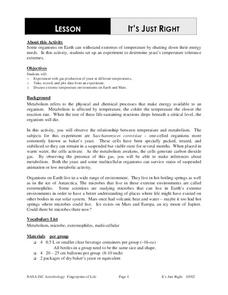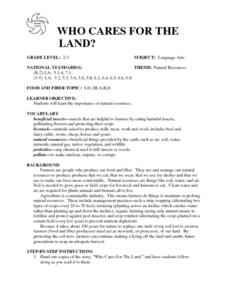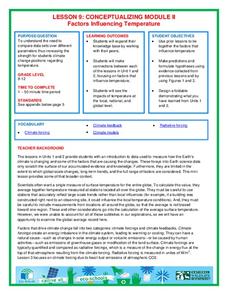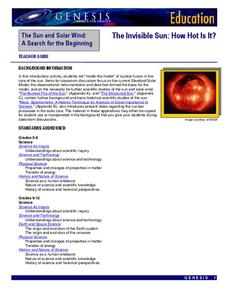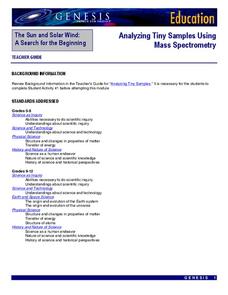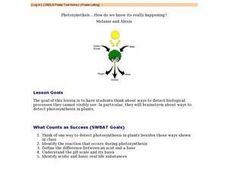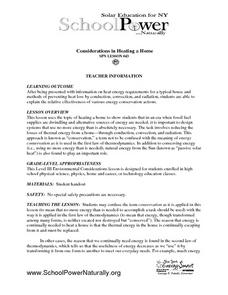Curated OER
It's A Meteor
Students complete a webquest to find Earth's relationship to the sun. In this webquest lesson plan, students complete tasks to understand the effect of the sun on weather and time. Students create a multimedia presentation as...
Curated OER
Modeling the Big Bang and the Formation of the Universe
Sixth graders conduct an experiment to understand the Big Bang Theory. In this Big Bang Theory lesson, 6th graders will observe a balloon with confetti popping to emulate and analyze information related tot he Big Bang theory....
Curated OER
Extraterrestrials
Students discuss the possibility of intelligent life in space. In this space science lesson, students decipher a radio message electronically transmitted in space. They create their own extraterrestrial welcome greeting.
Curated OER
It's Just Right
Students conduct an experiment to determine the temperature tolerance of yeasts. In this biology lesson, students collect data and compare them by plotting graphs. They explain how extreme temperatures affect organisms.
Curated OER
Impact Craters: Holes in the Ground!
Students simulate crater formation through a lab activity. In this space science lesson, students calculate how much energy is transferred during meteorite impact. They identify different factors affecting the size and depth of craters...
Curated OER
The Space Cadet's Laboratory: Using Electromagnetic Energy to Study Astronomy
Students build their own spectrophotometer to study light. In this physics lesson, students explain the dual nature of light. They calculate the angle of incidence and refraction using Snell's law equation.
Curated OER
Circles to Spheres
Students investigate circles and spheres. In this space shapes lesson plan, students compare and contrast two-dimensional and three-dimensional shapes. Students investigate the relationship between plane and space shapes.
Curated OER
Triangles
Students identify triangles in the real world and construct their own triangle using drinking straws. They explore abstract triangles and find additional geometric shapes such as trapezoids. Students discuss similar shapes and examine...
Chicago Botanic Garden
Micro-GEEBITT Climate Activity
A truly hands-on and inquiry based learning activity bridges all the lessons in the series together. Beginning with a discussion on average global temperatures, young meteorologists use real-world data to analyze climate trends in order...
Curated OER
Who Cares for the Land?
A very thorough lesson plan focuses on what plants need to grow and stay healthy. There are excellent reading activities and worksheets included in this fine plan. A terrific way to introduce a unit on plants and their needs.
Curated OER
Transportation Fuels: What Car Will You Drive?
How many different types of biofuels are out there? Seventh graders watch a series of videos and participate in a series of activities in order to better understand all the transportation options available. They consider what type of car...
Curated OER
Grow it Now, Drive it Later?
What do corn and career exploration have in common? A lot, if you're considering an agricultural career that contributes to alternative fuel resources. Through a series of films, presentations, activities, and readings, learners will...
National Wildlife Federation
Conceptualizing Module II - Putting It All Together
"Creativity is just connecting things." - Steve Jobs. After weeks of researching climate change, the ninth lesson in a series of 21 combines the data and analysis to address essential questions. It covers natural phenomenon, human...
Curated OER
Photosynthesis
Fifth graders work in small groups to brainstorm responses to a problem related to some disaster that wipes out half or all plant life on earth. Groups complete a graphic organizer to compare and contrast their ideas. Students select...
Chicago Botanic Garden
Albedo, Reflectivity, and Absorption
What is reflectivity, and what does it have to do with the Earth's climate? As reflectivity is measured by albedo, scientists can gather information on Earth's energy balances that relate to global warming or climate change. Budding...
NASA
The Invisible Sun: How Hot Is It?
It's getting hot in here! The first in a series of six lessons has learners model nuclear fusion with a simple lab investigation. Groups collect data and analyze results, comparing their models to the actual process along the way.
Curated OER
The Reason for the Seasons
Students compare graphs of their data that was generated on a NASA website. In this seasons lesson students complete a lab activity.
NASA
Analyzing Tiny Samples Using a Search for the Beginning Mass Spectrometry
Teach the basics of mass spectrometry with a hands-on lesson. The fourth in a series of six lessons explores how mass spectrometry measures the ionic composition of an element. Learners then compare and contrast relative abundance and...
Curated OER
Exploring the Water Cycle
The water cycle is one of earth's most easily observable processes, but demonstrating each step within classroom walls can be a challenge. Through a series of videos and quick demonstrations, cover each aspect of the hydrologic cycle in...
Ventura County Air Pollution Control District
Effects of Global Warming
Your learners have probably heard of climate change, but do they really understand what it is? Study the history, details, and future implications of global warming and the greenhouse effect with a set of activities designed for an...
Chicago Botanic Garden
GEEBITT (Global Equilibrium Energy Balance Interactive TinkerToy)
Students use the GEEBITT excel model to explore how global average temperatures are affected by changes in our atmosphere in part two of this series of seven lessons. Working in groups, they discuss, analyze graphs, and enter data to...
Curated OER
Rainforest Complexity and Diversity
Second graders investigate the diversity of plants and animals in a rainforest. They watch an online story developed by the Rainforest Alliance, observe and record animals in their local area, explore various websites, and compare and...
Curated OER
Photosynethsis....How do we know it's really happening? - Biology Teaching Thesis
High schoolers think of one way to detect photosynthesis in plants besides those ways shown in class. They identify the reaction that occurs during photosynthesis. Students define the difference between an acid and a base. They identify...
Curated OER
Considerations in Heating a Home
Emerging engineers discover how important it is to conserve energy as fossil fuel supplies are being diminished. This is accomplished by working through a handout that explains energy requirements for heating a home during the winter....
Other popular searches
- Solar System Crossword
- Solar System Worksheets
- Solar System Word Search
- Solar System Art
- The Solar System
- Solar System Lesson Plans
- Solar System Math
- School Projects Solar System
- Components of the Solar System
- Solar System Model
- Earth Movement Solar System
- Solar System Constellations





